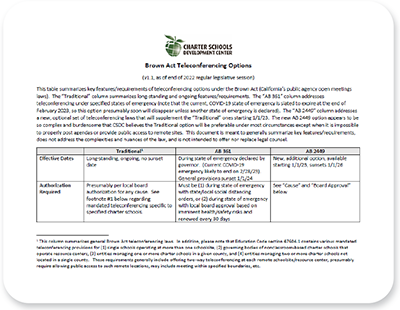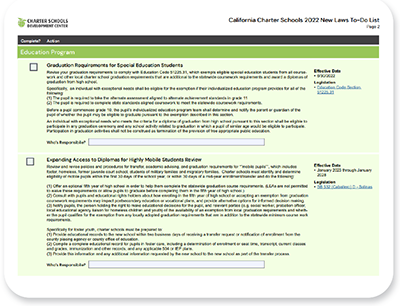In CSDC’s California Charter Schools 2022 New Laws To-Do List, we highlighted a new law that could impact how charter school boards make their meetings accessible to members of the public.
Assembly Bill 2449, which was authored by Assemblymember Blanca Rubio (D-Baldwin Park), established new teleconferencing options for public board meetings. The bill went into effect in January 2023, just before the pandemic-related state of emergency flexibility is slated to sunset at the end of February 2023.
Currently, there are three teleconferencing options available under the Brown Act, which is California's open meeting law for public schools. First is what we’re calling the “traditional” option because it has been in place for a long time. Second is AB 361 (R. Rvias), which applies only during states of emergency. Finally, we have AB 2449 (B. Rubio), which establishes new rules for board member participation in meetings if a physical or family medical emergency prevents a member from attending in person.
CSDC has developed a helpful table to understand the teleconferencing options available under the Brown Act. By understanding the key features and requirements of the “traditional” approach, AB 361, and AB 2449 options, charter schools can make informed decisions about how to conduct their meetings in compliance with the law.
Proceed with caution: the AB 2449 option is complex and burdensome, and the traditional option will be preferable under most circumstances except when it is impossible to properly post agendas or provide public access to remote sites.
Work with your board chairperson to review and revise board policy and procedures in effect once the pandemic-related state of emergency flexibility ends in February.
Specifically, review meeting teleconferencing policies and practices to:
- Reflect on the expiration of pandemic-related emergency flexibility that currently is set to expire after February 28, 2023,
- Refresh understanding of pre-existing teleconferencing options under the Brown Act, and
- Consider how to implement additional new teleconferencing options under AB 2449.
Please refer directly to the bill language for specific requirements. This article is intended as a general summary and should not be used as a replacement for legal counsel.
Want to learn more about how to conduct public meetings? Sign up for the Brown Act Training Course from CSDC’s Online Governance Academy. As always, please email us at csdc@chartercenter.org with specific questions!







